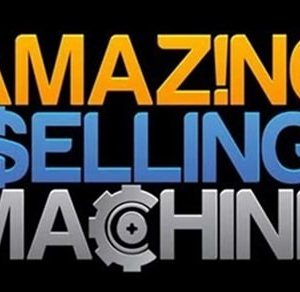[GroupBuy] Equity 2.0 Seminar 2025 – Perry Marshall
$2,990.00 Original price was: $2,990.00.$65.00Current price is: $65.00.
The Equity 2.0 Seminar emerges as a crucial beacon for businesses navigating the turbulent waters of AI disruption and economic upheaval. It offers a roadmap to not just survive, but thrive, in a landscape where adaptability and strategic foresight are paramount.
Table of Contents
Equity 2.0 Seminar
The business landscape is undergoing a seismic shift, fueled by the relentless advance of artificial intelligence and the impending culmination of an 18.6-year economic cycle. The message is clear: businesses must fundamentally rewire themselves for the AI era or face potential obsolescence. The Equity 2.0 Seminar is designed to guide business owners toward this critical transformation, providing the tools and insights needed to leverage AI, build robust defenses, and capitalize on the wealth transfer opportunity that lies ahead. This isn’t just about adopting new technologies; it’s about redefining business models and creating sustainable long-term value in a rapidly evolving world.
Adapt or Perish: The Binary Business Future
A central tenet of the AI disruption narrative is the unforgiving duality it presents: adapt and reap millions OR stagnate and face oblivion. There is no middle ground. This isn’t hyperbole; it’s a stark reflection of the accelerating displacement of human tasks and traditional business models by AI-powered solutions. This is not the slow, gradual change we’ve grown accustomed to; this is an exponential shift, a “Kairos moment,” where the window for decisive action is rapidly closing.
The speed at which AI is eroding the value of traditional assets is staggering. Information that once commanded premium prices – manuals, courses, PDF guides – is now readily available for free through AI chatbots like ChatGPT, Perplexity, and Google Gemini. This commoditization of information threatens businesses built on the expertise of human knowledge. Therefore, those who can ride this curve upward will benefit the most. And those who insist on the status quo will, in turn, cease to exist.
Adding urgency to this transformation is the culmination of the 18.6-year economic cycle in 2027, mirroring the financial crisis of 2008. This economic cycle presents both a threat and an opportunity. Those positioned to leverage AI and build resilient businesses will thrive during the subsequent economic reset. Those clinging to outdated models will be swept away. The Equity 2.0 Seminar serves as a critical preparation for navigating this impending economic shift and maximizing the potential for wealth creation.
The AI Compatibility Imperative: Beyond Traditional Metrics
Traditional business valuation metrics, built on recurring revenue, scalable systems, and market share, are losing their relevance in the face of the AI revolution. The future of business valuation hinges on one critical factor: AI Compatibility.
This AI compatibility goes far beyond simply using AI tools. It requires a fundamental rewiring of the business, a “Step Zero” that precedes all other strategic initiatives. This involves redefining products, offerings, client relationships, and media strategies to minimize reliance on assets that AI is driving to zero. A business’s ability to seamlessly integrate and leverage AI will be the prime determinant of its valuation.
This shift is evident in the emergence of new valuation metrics. AI-Enforced Network Effects, Proprietary Data Moats, Personalized Customer Experiences, and Optimized Operational Efficiency are now critical drivers of valuation. Each of these factors can potentially double the valuation multiple, creating significant wealth for businesses that demonstrate AI alignment. However, building these new moats doesn’t mean simply relying on intellectual property. Instead, it requires creating systems and structures that make it extremely difficult for competitors to replicate or overcome your AI-driven advantages.
Riding the Wealth Transfer Wave
The decline of dying industries fuels the flow of riches. This wealth doesn’t vanish; it shifts from those clinging to outdated models to those embracing the exponential curve of innovation. This transfer represents a once-in-a-generation opportunity for those who are willing to adapt and embrace the future.
True marketing, as defined by the author, is not about manipulation or trickery. It’s “the art and science of helping people who need each other find each other.” In this new landscape, the most successful businesses will be those that can leverage AI to facilitate meaningful connections and build genuine relationships with their customers.
Perry Marshall
Perry Marshall, a renowned marketing strategist and author, has a significant impact on the principles and strategies taught at the Equity 2.0 Seminar. He emphasizes a strategic and adaptive approach to marketing, particularly in the context of the rapidly changing digital landscape. Marshall’s philosophies, combined with the economic insights, form the bedrock of the Equity 2.0 Seminar’s actionable framework. By mastering these principles, businesses can achieve unprecedented growth, dominate their markets, and ultimately, create lasting wealth. The ability to stay ahead of the curve and adopt new strategies is what sets successful businesses apart from the rest.
Marshall’s Marketing Philosophy as a Catalyst for Change
Perry Marshall’s marketing philosophy goes far beyond traditional tactics, advocating for a scientific and adaptable approach. One of his core concepts is “80/20 Sales and Marketing,” which applies the Pareto Principle to marketing efforts. This principle suggests that 80% of your results come from 20% of your efforts, urging businesses to focus on the most effective strategies while cutting out the rest. This is especially vital in the age of AI, where experimentation and data-driven decision-making are more critical than ever.
Marshall also emphasizes the importance of understanding customer psychology. By focusing on the deeper motivations and desires of potential customers, businesses can create marketing messages that resonate on a deeper level. In the digital age, this means using data to customize and personalize marketing experiences, appealing to the unique needs and preferences of each individual customer. AI tools such as machine learning algorithms can analyze vast amounts of customer data to identify patterns and personalize marketing strategies to a detail hitherto impossible.
Furthermore, Perry Marshall is a proponent of lifelong learning and continuous improvement. He encourages marketers and business owners to stay abreast of the latest trends and technologies and to constantly refine their strategies based on real-world results. This mindset is essential for navigating the ongoing disruptions caused by AI and ensures that businesses remain agile and adaptive in the face of change. This constant state of improvement is what sets successful businesses apart.
Redefining Financial Landscapes for AI-Driven Growth
Facing the paradigm shift requires a robust financial backbone. It’s no longer about conventional lending or venture capital alone, but about optimizing assets, securing resources and leveraging financial wisdom. Shanyn Stewart contributes her proficiency by revealing methods to uncover underutilized assets, protect capital from taxes and synchronize all available resources, resulting in savings for decades to come. Moreover, Josh Long, with his profound insight, challenges traditional monetary approaches, emphasizing that aligning resources strategically makes finances naturally fall into place. This approach involves enhancing economic models and maximizing financial processes, leading to long-term financial stability and growth.
To effectively capitalize is a blend of vision, strategy and sound financial preparation. By harnessing AI, maximizing resources, and protecting assets business leaders can navigate unpredictable economic situation and lead their businesses toward tremendous growth and sustainability.
The Star Principle & Strategic Positioning
The Equity 2.0 Seminar draws upon the wisdom of Richard Koch to highlight the strategic importance of “Star” businesses. Koch, with his notable net worth, advocates that 5% of businesses globally secure half of all business profits, largely found in markets that consistently grow at a 10% rate annually or higher.
This star positioning is so impactful that if your business falls into the star category, various other shortcomings can be excused. This strategy takes precedence even over the quality of the Management team, robust marketing, or anything else. These traits hold the core strengths of a company’s equity.
Financial Preparedness and Strategic Growth
The financial aspects of adapting to the AI-driven economy require a significant change. Old approaches to business cannot withstand the AI revolution.
Liberating Assets and Optimizing Financial Structures
Many businesses operate with “rotting economic engines” where every dollar invested yields less than a dollar in return. This is a recipe for stagnation and eventual failure, especially in a rapidly evolving market. Businesses must prioritize internal financial optimization and build strong economic models that generate sustainable profits. Participants at the Equity 2.0 Seminar will discover methods to liberate assets you didn’t know you had, shield your capital from predatory taxes, and align all your resources. This can lead to substantial annual savings, freeing up capital for strategic reinvestment and growth.
Savvy financial management is crucial for navigating the complexities of the AI era. Traditional paths to funding like Private Equity/Venture Capital may not align with your long-term goals. Instead, seek partners who value what you’ve built and share your vision for the future. You’d better to focus on building optimized financial structures that support sustainable growth and value creation with each passing of year.
The Urgency of Action and Strategic Growth
The Equity 2.0 Seminar emphasizes the importance of seizing the present, stating that there is an 18-month window to adapt. From personal anecdotes to market trends, the moment needs to be acknowledged.
In the face of market changes, there is a need for leadership that emphasizes the personalized roadmap, a core promise of the Equity 2.0 Seminar.
Here’s a structured overview of key actions:
| Area of Focus | Key Actions | Potential Impact |
|---|---|---|
| AI Integration | Implement AI solutions to automate tasks, enhance customer service, and improve decision-making. | Increased efficiency, reduced costs, improved customer satisfaction, and competitive advantage. |
| Data Strategy | Build proprietary data moats by collecting and analyzing data to gain unique insights and personalize experiences. | Enhanced customer engagement, improved product development, and more effective marketing campaigns. |
| Financial Optimization | Liberate assets, shield capital from taxes, and optimize financial structures to free up capital for growth. | Increased profitability, improved cash flow, and greater financial flexibility. |
| Strategic Partnerships | Seek partners who align with your values and share your vision for the future. | Access to new markets, technologies, and expertise, and increased growth potential. |
Beyond Needing Money: Strategic Capital
The most common misconception among business owners is that they need money. Access to capital is good, but it’s not always the answer. Those who align all things strategically will take care of the money themselves. It’s about optimizing existing resources, building a strong economic model, and creating a business that generates sustainable profits. Money will take care of itself once your system is set up.
The Equity 2.0 Seminar offers personalized roadmaps and expert insights to guide businesses through this transformation. The main aim is positioning them for significant wealth creation and high-value exits, even for those not immediately planning to sell. This isn’t about short-term gains; it’s about building sustainable, long-term value in a rapidly changing world.
Conclusion
The Equity 2.0 Seminar serves as an urgent call to action for businesses facing the convergence of AI disruption and economic upheaval. Success hinges on recognizing the stark reality of either flourishing through AI adoption or fading into obsolescence. This encompasses fundamentally rewiring businesses for AI compatibility, establishing strong defenses like AI-Enforced Network Effects and Proprietary Data Moats, as well as strategically aligning marketing and financial structures. By embracing this paradigm shift and creating a roadmap for action, businesses can navigate the impending challenges, positioning themselves for substantial wealth creation and long-term success in the rapidly evolving business landscape.
Sales Page:_https://archive.is/S4XgJ
Delivery time: 12 -24hrs after paid












Reviews
There are no reviews yet.